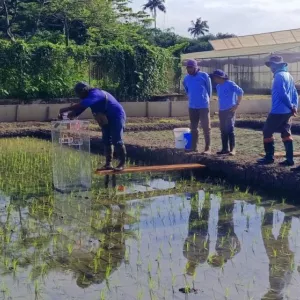BASF and IRRI join forces to reduce carbon footprint of rice
BASF and IRRI to study multiple options to enhance climate smart farming and improve carbon intensity in rice systems Research collaboration for multiple seasons in Laguna, Philippines Limburgerhof, Germany and Los Baños, Laguna, Philippines . BASF and the International Rice Research Institute (IRRI) have entered into a scientific collaboration to reduce greenhouse gas (GHG) emissions from rice production. Running by

BASF and IRRI join forces to reduce carbon footprint of rice
BASF and IRRI to study multiple options to enhance climate smart farming and improve carbon intensity in rice systems Research collaboration for multiple seasons in Laguna, Philippines
Limburgerhof, Germany and Los Baños, Laguna, Philippines . BASF and the International Rice Research Institute (IRRI) have entered into a scientific collaboration to reduce greenhouse gas (GHG) emissions from rice production. Running by the name “OPTIMA Rice” (Optimizing Management for Reduction of GHG in Rice), the collaboration with IRRI supports BASF’s commitment to enable the reduction of CO2e (carbon dioxide equivalent) emissions by 30 percent per ton of crop produced by 2030. The joint effort is planned for multiple rice seasons in the Philippines and will take place in Laguna, where both organizations maintain research centers for rice.
Rice is one of the five most widely produced cereal crops globally and is consumed by about three billion people every day . Although it is grown all over the world, Asia accounts for the largest share of its production. However, because of its geographic expansion and typical manner of wetland cultivation, worldwide paddy rice production contributes about 10 percent of total GHG emissions from the agricultural sector , mainly coming from continuously flooded wetland rice fields. Due to this large carbon footprint, it is estimated that rice production has the greatest potential within agricultural crop production to reduce GHG emissions .
BASF and IRRI therefore plan to explore multiple topics related to climate smart farming in rice. These include direct-seeded rice varieties, nitrogen stabilizers, nutrient and residue management, novel chemistry tailor-made for rice farmers, and water-saving technologies such as alternate wetting and drying management (AWD). In addition, IRRI has begun further improvements to its ecophysiological model ORYZA, to…

